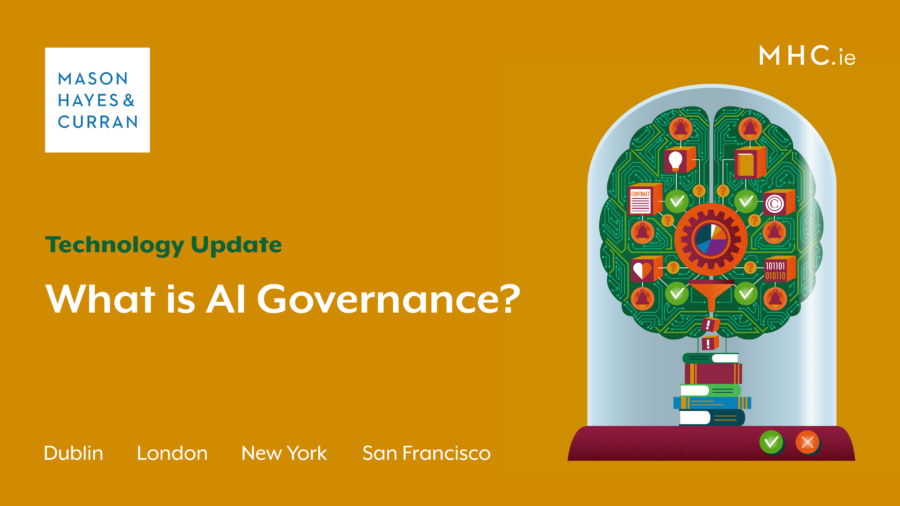What is AI Governance?

AI frameworks like governance and ethics are very challenging to understand and distinguish. Those who are new to AI technology need to learn the difference between these terms and use them appropriately. Brian McElligott, Head of Artificial Intelligence, examines why AI governance needs a lot of advance consideration and planning to avoid future commercial and ethical conflicts which can lead to reputational damage.
At the best of times, artificial intelligence terms can be a challenge to understand. When it comes to broader and even deeper AI topics like governance and ethics, it’s even more challenging and we often find ourselves grappling with the distinctions between them. In this article we are going to tackle, at a very high level, some of the key differences between:
- Data governance
- AI governance, and
- Ethical AI
Data governance
In a corporate setting, data governance involves setting policies and procedures to ensure that data is managed properly across the entire organisation. This encompasses defining data standards, implementing data security measures, and ensuring compliance with regulations like the GDPR. Data governance ensures that the company's data is accurate, available, and protected, providing a foundation for informed decision-making and use of that data in the context of internal and external channels. Responsibilities might include oversight of data storage, access controls, data quality, and auditing data usage to prevent misuse and to conform to legal standards.
AI governance
AI governance, on the other hand, is a broader concept that encompasses not only the data used by AI systems but also the design, development, implementation, and operation of the AI systems themselves. It is an overarching concept that includes various aspects of managing AI systems, such as technical, legal, and ethical considerations. While the legal and regulatory components of AI governance focus on compliance with existing laws and regulations like the GDPR and the EU AI Act, the ethical dimension goes further by addressing moral type implications and societal impacts of AI technologies. AI governance involves creating a framework of policies, ethical guidelines, standards, and practices to manage the risks and maximize the benefits of AI systems. It deals with questions about the transparency of AI decision-making processes (explainability), accountability for AI decisions, the fairness of outcomes (bias mitigation), and overall, AI impact on society.
Ethical AI
Finally, we have ethical AI, which means putting in place principles and practices to ensure that AI systems and products are not only compliant with laws and regulations but also adhere to ethical standards that may go above and beyond legal requirements. This would involve creating ethical guidelines for AI design and use, such as ensuring AI is fair, transparent, and respects user privacy. Ethical considerations may demand involvement from diverse stakeholders, including customers, employees, and potentially external advisors, to ensure a wide array of perspectives is considered. The aim is to prevent harm, discrimination, and other negative impacts that could arise from AI systems and to promote trust in the company and its products.
Comment
In conclusion:
- Data governance is about managing and regulating the use of data within organizations.
- AI governance is a wider term that includes the management of both the data and the AI systems that use this data, ensuring they are used safely and responsibly.
- Ethical AI focuses on the moral principles guiding the use and development of AI, often going beyond legal compliance to address societal concerns and values.
The key take-away for those new to AI technology is the need to understand the difference between these terms and use them appropriately (especially in market-facing materials). Companies also need to be aware of the well-known tensions between commercial goals, governance and ethical AI principals. It’s possible to marry these concepts on a case-by-case basis, but it needs a lot of advance consideration and planning to avoid future commercial and ethical conflicts which can lead to reputational damage.
For more information and expert advice, please contact a member of our Artificial Intelligence team.
The content of this article is provided for information purposes only and does not constitute legal or other advice.
Share this:





